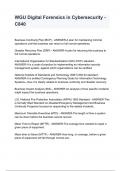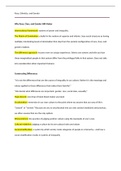Exam (elaborations)
WGU C840 Digital Forensics in Cybersecurity - all Questions & answers solved accurately with Complete Solution Graded A+ latest version
WGU C840 Digital Forensics in Cybersecurity - all Questions & answers solved accurately with Complete Solution Graded A+ latest version
[Show more]




